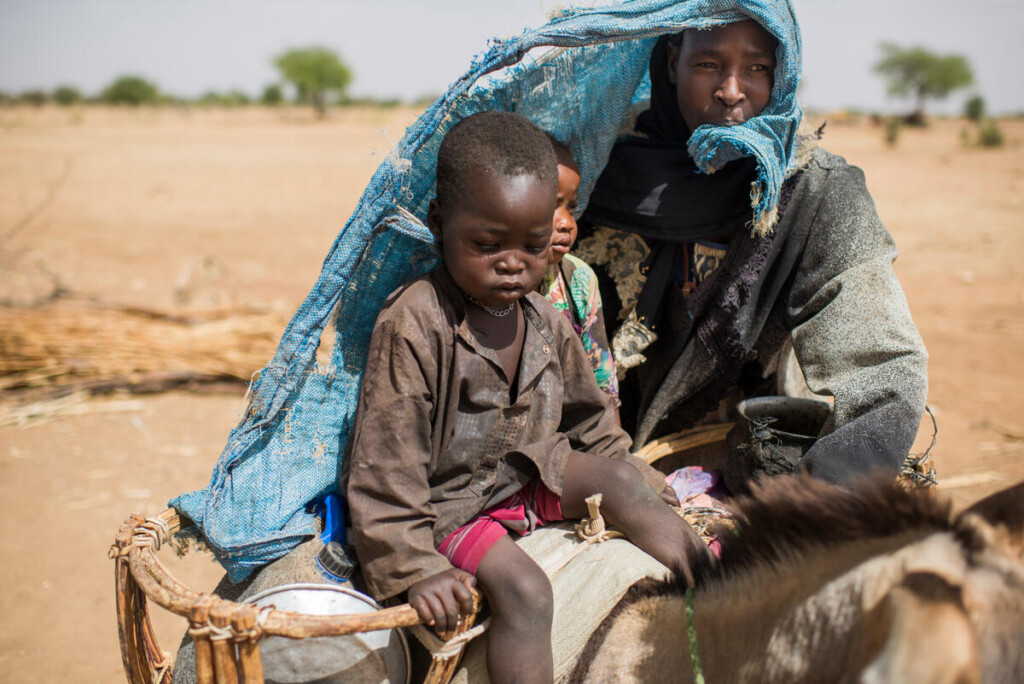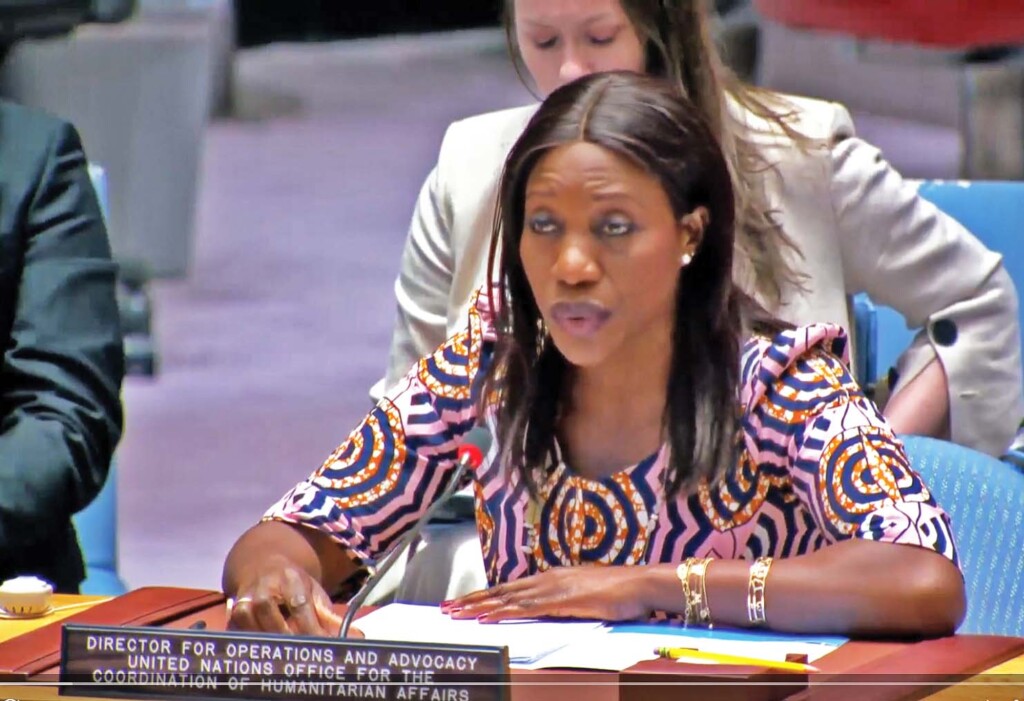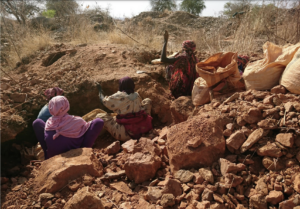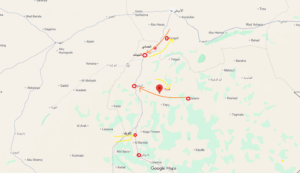OCHA: ‘Sudan continues to spiral into chaos’

Sudanese refugees in Chad (File photo: © Colin Delfosse / UNCHR)
The humanitarian crisis in Sudan continues to spiral into chaos, and conditions are relentlessly deteriorating for people in most parts of the country, the UN Office for the Coordination of Humanitarian Affairs (OCHA) warned the UN Security Council (UNSC) in New York yesterday.
Speaking on behalf of the Under-Secretary-General for Humanitarian Affairs and Emergency Relief Coordinator Martin Griffiths, Edem Wosornu, OCHA’s Director of Operations and Advocacy reminded the UNSC of the ongoing humanitarian emergence in Sudan.
“In less than four months, this is the sixth time we have briefed this Council on the humanitarian emergency in Sudan. The 12th time since the conflict broke out in April 2023. Each time, we have warned about the relentless deterioration of conditions for people in most parts of the country. Today, I regret to inform you that Sudan continues to spiral into chaos,” Wosornu said.
Sudan, which has been engulfed in conflict since April 2023, continues to see a devastating impact on its civilian population. “In less than four months, this is the sixth time we have briefed this Council on the humanitarian emergency in Sudan. The 12th time since the conflict broke out in April 2023,” says Wosornu, highlighting the severe conditions in El Fasher, capital of North Darfur, and a major hotspot of the conflict; where the lives of two million people, including women, children, the elderly, and disabled people, hang precariously in the balance.

Edem Wosornu, OCHA’s Director of Operations and Advocacy briefs the UN Security Council on behalf of the Under-Secretary-General for Humanitarian Affairs and Emergency Relief, Martin Griffiths (Photo: UNTV)
This includes 800,000 people who have been displaced from surrounding areas in Darfur, holding out in El Fasher as a last bastion. The conflict has led to widespread bombing and shelling in densely populated areas, resulting in long term harm to civilians and a severe disruption of essential services.
Humanitarian access and escalating needs
The conflict has caused massive displacement, with at least 130,000 people fleeing El Fasher since April 1, 2024, to already strained regions in Darfur and neighbouring Chad. Over 8.8 million people were displaced as of May 2024, including 6.8 million internally displaced. By June 2024, the number of fatalities had reached 15,550, with over 1,400 violent events targeting civilians, though it is believed this number is grossly underreported and estimates are to the “factor of 10 or 15”. The humanitarian response has been significantly hindered by the destruction of infrastructure, including the looting and closure of the Southern Hospital in El Fasher, the only facility with surgical capacity in the city.
“Over 80 per cent of hospitals and clinics are now not functioning in some of the worst affected areas”, exacerbating the crisis. Médecins Sans Frontières (MSF) reported that more than 1,300 people were injured in El Fasher between May 25 and June 6 alone.
The humanitarian needs across Sudan are escalating at an alarming rate. Famine looms large, with nearly five million people facing emergency levels of food insecurity, particularly in conflict-affected areas. “Famine is imminent. Almost five million people face emergency levels of food insecurity (IPC level 4 in the Integrated Food Security Phase Classification)”. In June, the UN warned that if farmers do not receive necessary seeds for the planting season, the food security situation will deteriorate further.
‘Grave violations against children in Sudan have increased by 480 per cent…’
Basic services are collapsing, leaving pregnant women and new mothers at heightened risk of malnutrition and death. The UN Population Fund (UNFPA) has reported increasing rates of conflict-related sexual violence, and the UN Secretary-General’s report noted a staggering 480 per cent increase in grave violations against children, rising from 300 in 2022 to over 1,700 in 2023.
The safety of humanitarian workers is a growing concern. In the past six weeks alone, six aid workers have been killed, bringing the total to 24 since the conflict began.
Urgent call for action
Despite some recent improvements in humanitarian operations, such as the approval of visas and travel permits for aid workers and the movement of aid supplies, the situation remains critical. In May 2024, 860,000 people did not receive necessary assistance due to violence and bureaucratic hurdles. By June 2024, the humanitarian community had moved 147 trucks with 4,900 metric tons of aid, with plans for 600 trucks carrying 18,800 metric tons of aid for the upcoming months. The humanitarian appeal for Sudan is significantly underfunded, with only 16 per cent of the required $2.7 billion received. Wosornu acknowledged recent contributions, including $315 million from the United States and $70 million from the United Arab Emirates, but stressed the urgent need for more support.
‘We are in a race against time to avert massive loss of life in this unprecedented protection and food security crisis in Sudan…’
In her closing remarks, Wosornu reiterated the UN’s three key demands: the protection of civilians, unimpeded humanitarian access, and increased funding. Most importantly, she called for an immediate end to the conflict, echoing the pleas of Sudanese civilians who simply want their lives back. The UNSC and international community face a pressing challenge to act decisively and prevent further loss of life in Sudan, where every passing day without intervention results in more suffering and devastation.
“We are in a race against time to avert massive loss of life in this unprecedented protection and food security crisis in Sudan.”
Last month, UN Resident and Humanitarian Coordinator for Sudan, Clementine Nkweta-Salami, warned that “time is running out” as famine, disease and fighting close in on the population, with no end in sight.
Speaking to journalists at UN Headquarters in New York, she said: “The international community cannot stand by as this crisis spirals out of control, as the noose of this conflict tightens its stranglehold on the civilian population.”
Last Thursday, UN Secretary-General António Guterres has expressed his deep concern about the continued fighting in El Fasher, capital of North Darfur, and throughout Sudan, stressing the urgent need for a ceasefire to protect vital infrastructure and alleviate the suffering of civilians. The UNSC also adopted a British-drafted resolution on Thursday, demanding that the paramilitary Rapid Support Forces (RSF) cease its blockade on El Fasher. The resolution was supported by 14 members with Russia abstaining. UNSC members renewed their calls for an immediate cessation of hostilities, de-escalation, and the withdrawal of all belligerents threatening civilian safety in El Fasher.











 and then
and then